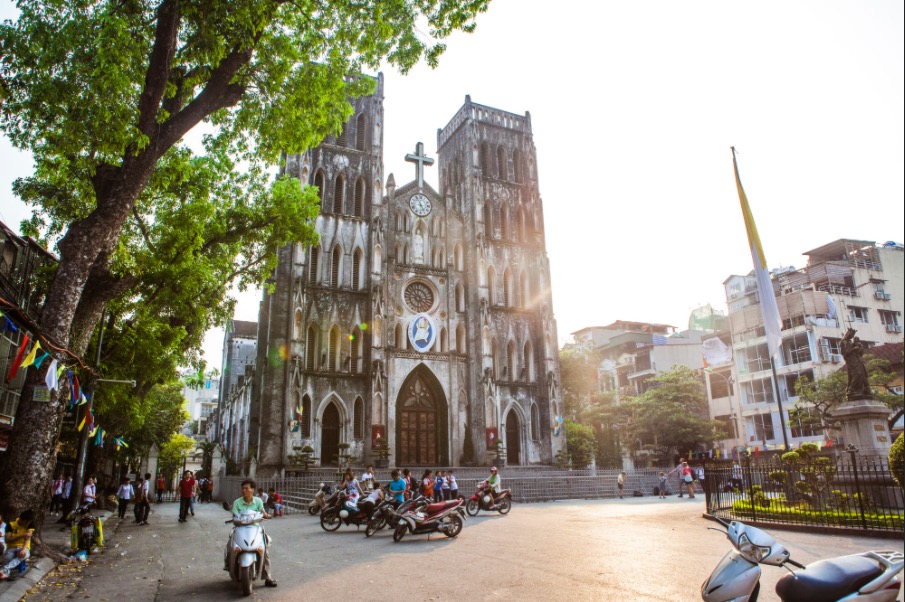Best Time To Visit Hanoi
Overview
Hanoi's climate reflects the tropical monsoon characteristics of Northern Vietnam, featuring hot and humid summers and cooler, dry winters. Autumn months—particularly September, October, and early November—remain the best times to visit. During this period, the weather is exceptionally pleasant, with mild temperatures, refreshing breezes, and occasional light mizzle. The fresh air and gentle sunlight highlight the city's beauty, enhancing the allure of its landscapes and inspiring countless artistic endeavors.
 Photo by @Kyumok Jung
Photo by @Kyumok Jung
Weather by month
Many assume that Vietnam's tropical climate translates to consistently hot weather; however, Hanoi experiences four distinct seasons, each showcasing different humidity levels, temperatures, and cultural experiences.
Visitors may find Hanoi's weather unpredictable; particularly when compared to the more stable climate of its southern counterpart, Ho Chi Minh City. Despite the variability, many find the excitement of Hanoi’s dynamic weather enjoyable.
Below is an overview of Hanoi's weather by month:
| Month | Average Temperature | Humidity |
| January | 17°C | 68% |
| February | 18°C | 73% |
| March | 20°C | 78% |
| April | 24°C | 76% |
| May | 28°C | 73% |
| June | 30°C | 75% |
| July | 29°C | 76% |
| August | 29°C | 79% |
| September | 28°C | 76% |
| October | 25°C | 69% |
| November | 27°C | 68% |
| December | 19°C | 67% |
Weather in January
January is one of the coldest months in Hanoi, with average temperatures ranging from 14°C (57°F) to 20°C (68°F). Morning temperatures can dip below 10°C (50°F), making it feel particularly chilly. The month witnesses moderate humidity around 70% and light rain about 7 to 14 days, with total precipitation averaging 21mm. Daily, the city experiences around 3 hours of sunshine, while UV levels can still be high due to 11 hours of daylight.
Month | High / Low (°C) | Average rainfall (mm) | Rainy days |
January | 20°C/14°C | 21mm | 7 to 14 days |
Pros and cons for visiting Hanoi in January
Pros:
- There are many opportunities for outdoor activities due to the pleasant climate.
- As the new year begins, travelers can enjoy the festive atmosphere post-Tet holiday.
- This is an off-peak season for tourists, promoting a quieter experience.
Cons:
- Drizzles may detract from outdoor plans.
- Many businesses may close for Tet holiday, limiting dining and shopping options.
Weather in February
February offers mild and moderate weather as spring approaches, with average temperatures varying between a low of 15°C (59°F) and a high of 21°C (70°F). Rainfall averages around 26mm over approximately 13 rainy days, contributing to the damp atmosphere, with about 2 hours of sunshine per day.
Month | High / Low (°C) | Average rainfall (mm) | Rainy days |
February | 21°C / 15°C | 26mm | 13 |
Pros and cons for visiting Hanoi in February
Pros:
- The comfortable climate allows visitors to easily engage in various activities.
- February hosts a range of vibrant events and festivals.
Cons:
- Occasional cold nights may be a surprise for visitors.
- Increased rain can affect outdoor sightseeing.
- The influx of locals returning from lunar Tet holiday can lead to crowded conditions.
Weather in March
In March, Hanoi experiences a sweet transition from winter to spring. Average temperatures range from 18°C (64°F) to 23°C (73°F), occasionally hitting highs of 32°C (90°F). Rainfall spikes to 40-50mm, typically over 15 to 22 wet days, while humidity remains around 76%.
Month | High/ Low (°C) | Average rainfall (mm) | Rainy days |
March | 23°C/ 18°C | 40mm to 50mm | 15 to 22 |
Pros and cons for visiting Hanoi in March
Pros:
- The landscape in March, dotted with blooming flowers, is visually stunning.
- With the Tet holiday behind, numerous festivals are still ongoing.
Cons:
- Flu season poses health challenges with changing temperatures.
- The UV index rises, necessitating sun protection.
Weather in April
As April arrives, Hanoi transitions into warmer weather with temperatures rising between 21°C (70°F) and 28°C (82°F). The month signals the start of the rainy season, with total precipitation averaging 91mm over 13 to 18 wet days.
Month | High/ Low (°C) | Average rainfall (mm) | Rainy days |
April | 28°C/ 21°C | 91mm | 13 to 18 days |
Pros and cons for visiting Hanoi in April
Pros:
- Morning coolness reflects the beauty of spring and offers enjoyable experiences for tourists.
- Longer days facilitate exploration before the intense heat of summer arrives.
Cons:
- Flu risks linger due to the fluctuating weather.
- Limited significant festivals or activities occur this month.
Weather in May
With the oncoming summer, May brings warming temperatures ranging from 24°C (75°F) to 32°C (89°F), occasionally exceeding 37°C (98°F). Rainfall increases sharply to 191mm spread across 14 to 18 days.
Month | High/ Low (°C) | Average rainfall (mm) | Rainy days |
May | 32°C/ 24°C | 191mm | 14 to 18 days |
Pros and cons for visiting Hanoi in May
Pros:
- Daytime warmth is delightful for outdoor activities and sightseeing.
- Evenings can be refreshing, promoting good sleeping conditions.
Cons:
- Short but intense rains can interrupt plans.
- Visitors may struggle to adjust to the climate after seasonal changes.
- A significant number of local establishments may close for the May Day holiday.
Weather in June
June marks the start of hotter, more humid weather, with average highs around 32.6°C and lows of 25.8°C. Expect substantial rain, averaging 229mm across 14 rainy days and potential thunderstorms.
Month | High/ Low (°C) | Average rainfall (mm) | Rainy days |
June | 32.6°C/ 25.8°C | 229mm | 14 |
Pros and cons for visiting Hanoi in June
Pros:
- Longer days provide ample opportunity to uncover Hanoi's charms.
Cons:
- Intense sun can lead to fatigue and potential skin damage.
- Flooding can occur during heavy rains, affecting mobility.
Weather in July
July remains one of the hottest months with temperatures often reaching 33°C (91°F), accompanied by high humidity and frequent thunderstorms. Rainfall averages 225mm over 19 wet days. Sunshine generally amounts to around 6 hours each day.
Month | High/ Low (°C) | Average rainfall (mm) | Rainy days |
July | 33°C / 26°C | 225mm | 19 |
Pros and cons for visiting Hanoi in July
Pros:
- Occasionally nice weather days enhance outdoor experiences.
Cons:
- Travelers from cooler climates may find conditions oppressive.
- Frequent storms can disrupt travel itineraries.
- July offers little in terms of cultural events.
Weather in August
August is characterized by high humidity and heavy rain, with average temperatures between 27°C and 32°C. Precipitation can reach around 340mm over 18 days, and conditions may still produce thunderstorms.
Month | High/ Low (°C) | Average rainfall (mm) | Rain |
August | 32°C/ 27°C | 340mm | 18 days |
Pros and cons for visiting Hanoi in August
Pros:
- Unique seasonal dishes and fragrances fill the air, enhancing the cultural experience.
- Outdoor excursions are often less crowded due to fewer tourists.
Cons:
- Heavy rains can deter outdoor activities.
- Increased illness risk during weather transitions.
Weather in September
September signals the onset of autumn with enjoyable temperatures and vibrant foliage. Average high temperatures drop to 31°C while lows hover around 26°C. Sunny hours increase to about 5, but the month still experiences 15 rainy days with total rainfall around 251mm.
Month | High/ Low (°C) | Average rainfall (mm) | Rain |
September | 31°C/26°C | 251mm | 15 days |
Pros and cons for visiting Hanoi in September
Pros:
- Comfortable weather enhances outdoor adventures and sightseeing.
- Bring your camera to capture the fall colors that add to the city's charm.
Cons:
- Weather inconsistencies may complicate packing for your trip.
Weather in October
October ushers in mild weather with few heavy rains and average temperatures not exceeding 28°C, dipping to a low of 23°C by month’s end. Rainfall drops to an average of 146mm over 14 days.
Month | High/ Low (°C) | Average rainfall (mm) | Rain |
October | 28°C/23°C | 146mm | 14 days |
Pros and cons for visiting Hanoi in October
Pros:
- The autumn ambiance invites leisurely strolls and outdoor exploration.
- Fewer tourists allow for a more intimate experience of the city.
Cons:
- Nights can be quite chilly; ensure you pack warm clothing.
- Limited events may reduce entertainment options.
Weather in November
November typically brings cooler weather as winter approaches, with average highs around 24°C and lows dropping to 19°C. Cloud cover increases, with only 2-3 hours of daily sunshine and about 46mm of rainfall over 5 days.
Month | High/ Low (°C) | Average rainfall (mm) | Rainy days |
November | 24°C/19°C | 46mm | 5 days |
Pros and cons for visiting Hanoi in November
Pros:
- Cool, pleasant weather is ideal for exploration.
- A vibrant street food scene thrives during this season.
Cons:
- Limited events may lead to quieter experiences.
Weather in December
December marks the coldest month in Hanoi, with average high temperatures of 22°C and lows dropping to around 19°C. Evenings can dip to approximately 11°C. Rainfall is lower at 14mm over 7 days, and daylight is shorter, averaging about 3 hours of sunshine.
Month | High/ Low (°C) | Average rainfall (mm) | Rain |
December | 22°C/19°C | 14mm | 7 days |
Pros and cons for visiting Hanoi in December
Pros:
- Cool weather is perfect for outdoor activities such as biking or exploring historical sites.
- The culinary scene shines with seasonal specialties and festive celebrations.
Cons:
- Dry air may lead to discomfort for some visitors.
- Reduced daylight can limit exploration time.

Travel Tips: Taking Local Bus Like A Local
If you are traveling on a budget and want to fully experience Hanoi, bus is definitely worth considering.

7 Best Places To Go In Hanoi Over Tet Holiday
If you’ve ever stayed in Hanoi over Tet holiday—Lunar New Year—you know this: it’s desolate.

Hanoi Travel Directory
If you do not know how to navigate through the mountain of information published on Vietnam Online and elsewhere in the world about Hanoi, this is your one stop guide to travel and living in Hanoi.








